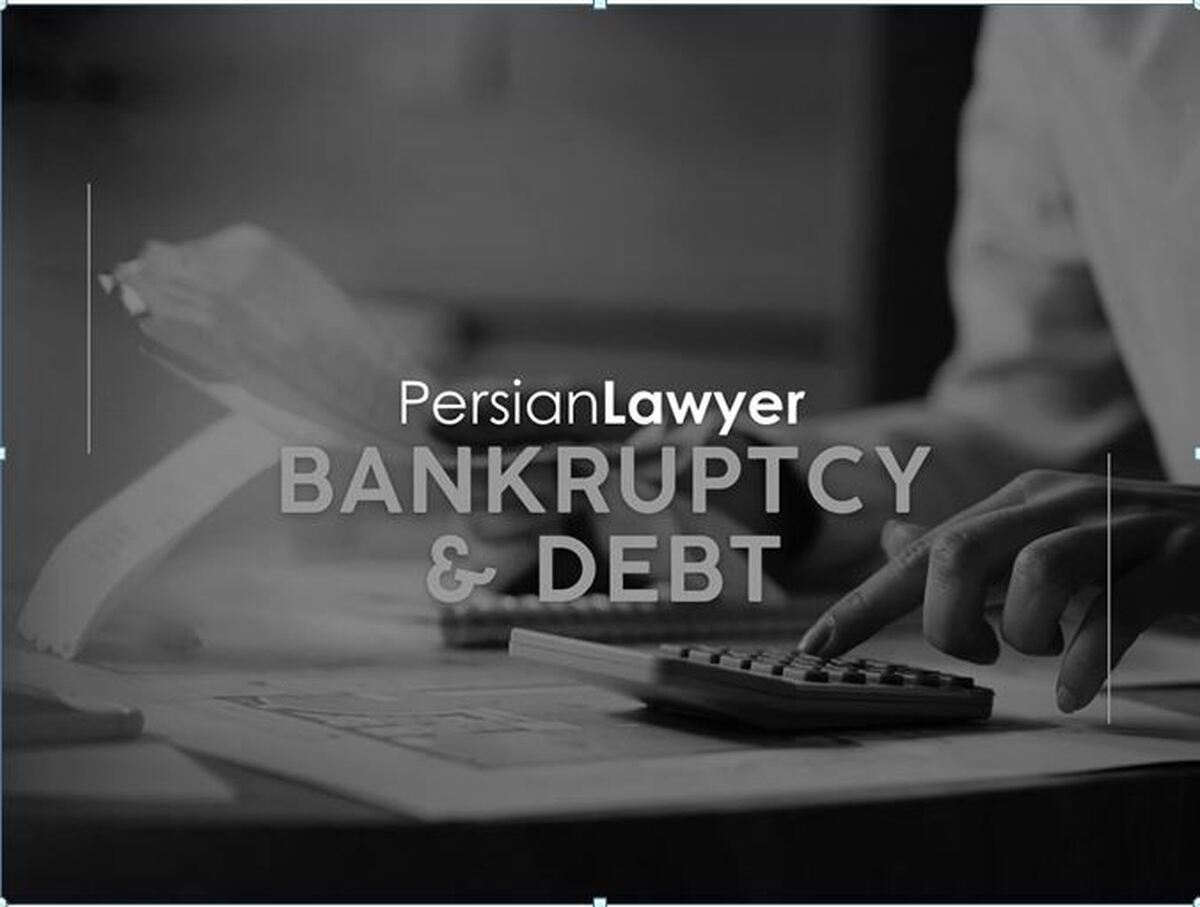Iranian Bankruptcy and Debt Lawyers & Guiding Through Financial Struggles

IranianLawyer.com - Facing financial difficulties, such as overwhelming debt or the prospect of bankruptcy, can be an emotionally and financially draining experience. Iranian Bankruptcy and Debt Lawyers in the legal landscape of the United States bring a unique blend of legal expertise and cultural understanding to assist individuals and businesses. These lawyers offer invaluable guidance and support, helping clients navigate complex financial situations while preserving their dignity and financial well-being.
Understanding Debt Types:
Iranian Bankruptcy and Debt Lawyers are well-versed in the various types of debt, including consumer debt, medical bills, credit card debt, and business-related liabilities. They help clients understand the nature of their debt and its implications.
- Debt Categorization:Iranian Bankruptcy and Debt Lawyers excel in categorizing various types of debt, which can range from consumer debt such as credit cards and personal loans to medical bills and business-related financial obligations. They carefully assess the nature and origin of each debt to develop tailored solutions.
- Debt Analysis: Lawyers with expertise in debt relief conduct thorough debt analysis for their clients. They scrutinize the details of each debt, including interest rates, repayment terms, and any potential legal implications. This meticulous analysis ensures that clients have a comprehensive understanding of their financial obligations.
- Prioritizing Debts: One crucial aspect of debt management is prioritizing which debts to address first. Iranian Bankruptcy and Debt Lawyershelp clients identify high-priority debts, such as mortgage payments or secured loans, and lower-priority debts like unsecured credit card balances. This strategic prioritization guides clients in allocating their resources effectively.
- Assessing Legal Consequences: Different types of debt may have varying legal consequences if left unresolved. Iranian lawyers explain the potential legal ramifications associated with each type of debt. They outline the risks and benefits of different debt relief strategies, empowering clients to make informed decisions.
- Customized Debt Solutions: Debt is not one-size-fits-all, and Iranian lawyers understand this. They tailor debt relief solutions to the specific categories of debt their clients are facing. Whether it's negotiating with creditors for medical bill reductions or pursuing bankruptcy for credit card debt, these lawyers design strategies aligned with the unique circumstances of each client.
- Education on Debt Types: Part of their role is educating clients about the characteristics of different debt types. By providing clients with a clear understanding of the origins and implications of their debts, Persian Bankruptcy and Debt Lawyersempower them to take proactive steps toward financial recovery.
Bankruptcy Filing:
In cases where debt becomes overwhelming, Persian Bankruptcy and Debt Attorneysguide clients through the bankruptcy process. They explain the differences between Chapter 7 and Chapter 13 bankruptcy, assess eligibility, and assist in filing the necessary documents to obtain a fresh financial start.
- Chapter 7 Bankruptcy:Persian Bankruptcy and Debt Lawyersspecializing in bankruptcy law are well-versed in Chapter 7 bankruptcy proceedings. They carefully assess clients' financial situations to determine eligibility for Chapter 7 bankruptcy, which involves the liquidation of non-exempt assets to discharge debts. These lawyers guide clients through the entire process, from preparing the necessary documentation to representing them in court, if required.
- Chapter 13 Bankruptcy: For clients with a regular source of income and the ability to repay a portion of their debts, Iranian attorneys offer guidance on Chapter 13 bankruptcy. This form of bankruptcy involves creating a manageable repayment plan over several years. Iranian lawyers help clients develop a feasible plan, ensuring that it adheres to legal requirements and meets their financial capabilities.
- Bankruptcy Documentation: Filing for bankruptcy requires extensive documentation, including financial statements, asset listings, income records, and debt schedules. Iranian Bankruptcy and Debt Lawyersassist clients in compiling these documents accurately and comprehensively. They ensure that all required paperwork is filed correctly and in compliance with the law.
- Negotiating with Creditors: Prior to filing for bankruptcy, Iranian lawyers often engage in negotiations with creditors on behalf of their clients. They seek to reach favorable settlement agreements that can mitigate the need for bankruptcy or streamline the bankruptcy process. This negotiation expertise can result in reduced debts and more manageable repayment terms.
- Bankruptcy Petition Preparation: Filing for bankruptcy involves submitting a formal petition to the court. Iranian lawyers take care of the entire petition preparation process. They ensure that all details are accurately represented, and they provide legal guidance on the most appropriate bankruptcy chapter for the client's unique financial situation.
Preserving Dignity:
Financial struggles can be emotionally taxing. Iranian Bankruptcy and Debt Lawyersprioritize preserving their clients' dignity throughout the debt relief process. They approach cases with empathy and sensitivity to the emotional toll that financial challenges can take.
- Sensitive Approach:Persian Bankruptcy and Debt Lawyers approach their clients' financial challenges with sensitivity and respect. They recognize that individuals and businesses facing financial difficulties may be experiencing stress, anxiety, and even shame. These lawyers create a supportive and non-judgmental environment where clients feel safe discussing their financial situations.
- Cultural Sensitivity: Understanding the cultural nuances of their clients is crucial for Iranian lawyers. They appreciate the significance of dignity in Iranian culture and strive to preserve it throughout the debt relief process. This cultural sensitivity ensures that clients' values and traditions are respected.
- Non-Stigmatizing Approach: Bankruptcy and debt challenges can often carry a stigma, leading individuals to feel embarrassed or isolated. Iranian Bankruptcy and Debt Lawyersconvey to their clients that financial struggles are a common part of life, and seeking help is a responsible and courageous step toward regaining control of their finances.
- Emotional Support: Beyond legal advice, Iranian lawyers offer emotional support to clients. They listen attentively to clients' concerns, provide reassurance, and offer guidance on managing the emotional toll that financial difficulties can have on individuals and families. This compassionate approach fosters trust and confidence.
- Empowerment: Preserving dignity also means empowering clients to actively participate in the resolution of their financial challenges. Persian Bankruptcy and Debt Lawyersencourage clients to take an active role in decision-making, helping them regain a sense of control over their financial futures.
Credit Counseling:
In addition to legal services, Iranian Bankruptcy and Debt Lawyersoften recommend credit counseling to help clients develop sound financial management skills. This proactive approach empowers clients to regain control over their finances and prevent future debt problems.
- Educational Programs:Most Persian Bankruptcy and Debt Lawyers recognize the importance of education in empowering clients to make informed financial decisions. They often refer clients to reputable credit counseling agencies and financial management programs. These programs provide valuable insights into budgeting, debt management, and responsible financial practices.
- Credit Counseling Sessions: Credit counseling sessions are a critical component of debt relief processes. Iranian lawyers guide clients in selecting accredited counseling agencies that offer sessions in Farsi. These sessions help clients understand the factors contributing to their debt and explore strategies for reducing it.
- Budgeting Assistance: Credit counseling programs assist clients in creating realistic budgets tailored to their financial circumstances. Iranian Bankruptcy and Debt Lawyersensure that clients have access to counselors who can offer guidance in Farsi, helping them develop spending plans that align with their income and financial goals.
- Debt Management Plans (DMPs): For clients with multiple debts, credit counseling agencies may recommend DMPs. Iranian lawyers explain the benefits and drawbacks of DMPs, assist clients in enrolling in suitable plans, and ensure that clients comprehend the terms and conditions associated with these programs.
- Financial Literacy Workshops: In some cases, Iranian attorneys may organize or recommend financial literacy workshops and seminars conducted in Farsi. These workshops cover topics such as debt reduction strategies, credit score improvement, and long-term financial planning.
What do Iranian Bankruptcy & Debt Lawyers do?
Iranian Bankruptcy and Debt Lawyers offer more than just legal expertise; they provide compassionate support to individuals and businesses navigating challenging financial circumstances. Their ability to understand the cultural nuances of their clients' backgrounds, coupled with their legal acumen, makes them invaluable allies in the pursuit of debt relief and financial stability.
By preserving dignity, providing clear guidance in Farsi, and offering comprehensive legal assistance, these lawyers play a vital role in helping clients regain control of their financial futures and embark on a path toward a debt-free life.
Disclaimer: This article is for informational purposes only and does not offer any legal advice.
4155/MAG




















